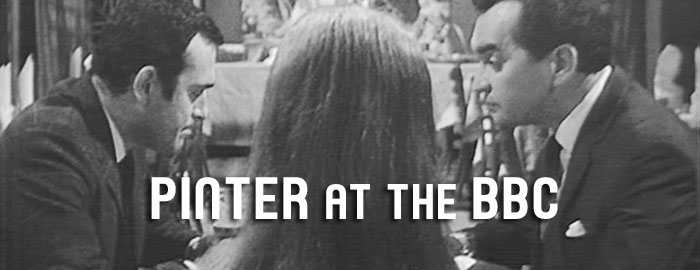
BFI (DVD) (UK RB PAL)

BFI (DVD) (UK RB PAL)
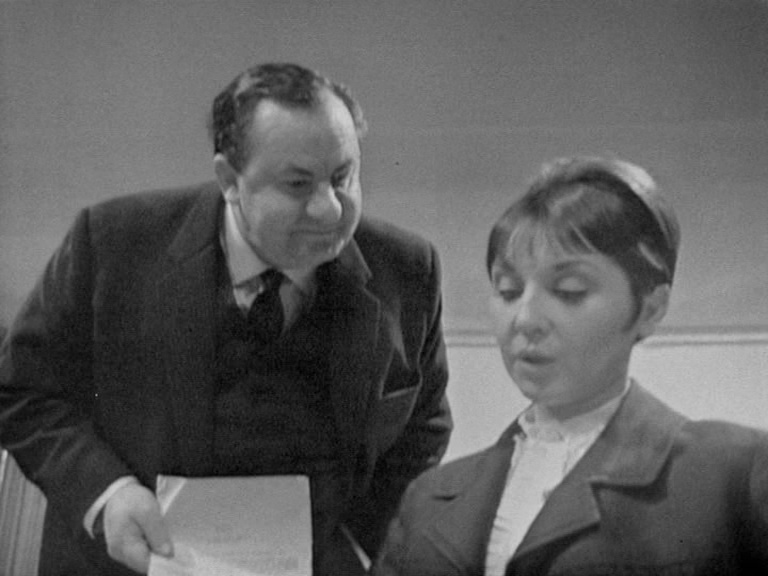 divisive and important as they come among modern dramatists,
divisive and important as they come among modern dramatists, 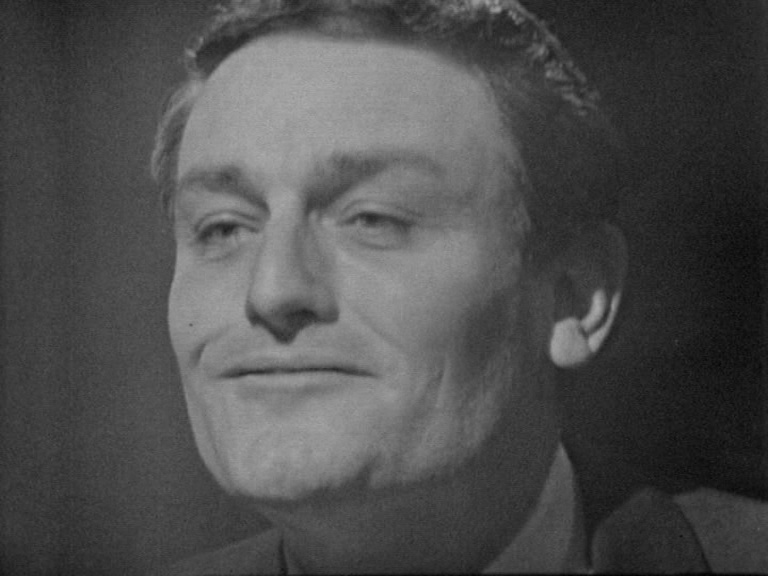 Harold Pinter became a major brand name in theatrical circles with his heady, often challenging dramas featuring a minimal number of characters, usually a single setting, and a wide capacity for interpretation from the audience. His career in film and television was an inevitable offshoot as he took up screenwriting and acting for both his own work and that of others, with his name becoming widely known through many avenues including his acclaimed collaborations with Joseph Losey on The Servant, The Accident, and The Go-Between. Though his work has been adapted for a variety of television programs over the years, his decades-long history with the BBC has resulted in a particularly rich and fascinating body of work that has largely remained very difficult to see until the BFI's much-needed five-disc DVD boxed set in 2019.
Harold Pinter became a major brand name in theatrical circles with his heady, often challenging dramas featuring a minimal number of characters, usually a single setting, and a wide capacity for interpretation from the audience. His career in film and television was an inevitable offshoot as he took up screenwriting and acting for both his own work and that of others, with his name becoming widely known through many avenues including his acclaimed collaborations with Joseph Losey on The Servant, The Accident, and The Go-Between. Though his work has been adapted for a variety of television programs over the years, his decades-long history with the BBC has resulted in a particularly rich and fascinating body of work that has largely remained very difficult to see until the BFI's much-needed five-disc DVD boxed set in 2019. 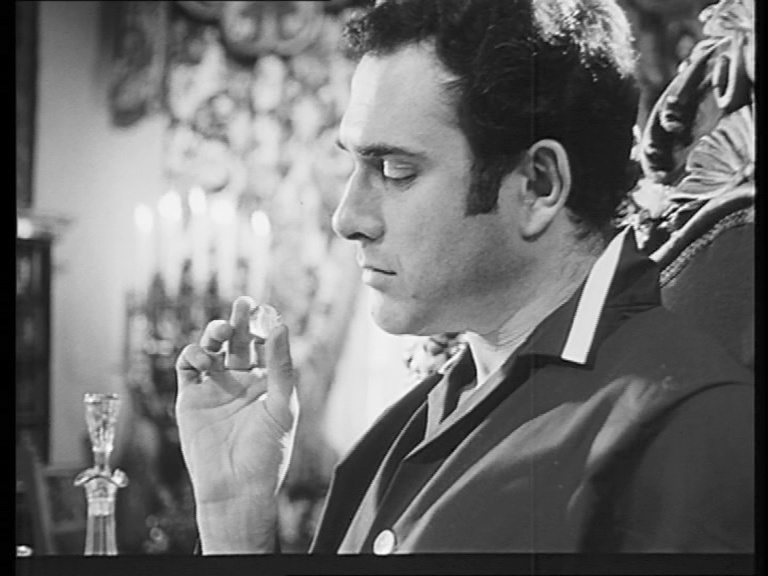 of both a basement flat and the attentions of a young woman, Jane, over the
of both a basement flat and the attentions of a young woman, Jane, over the 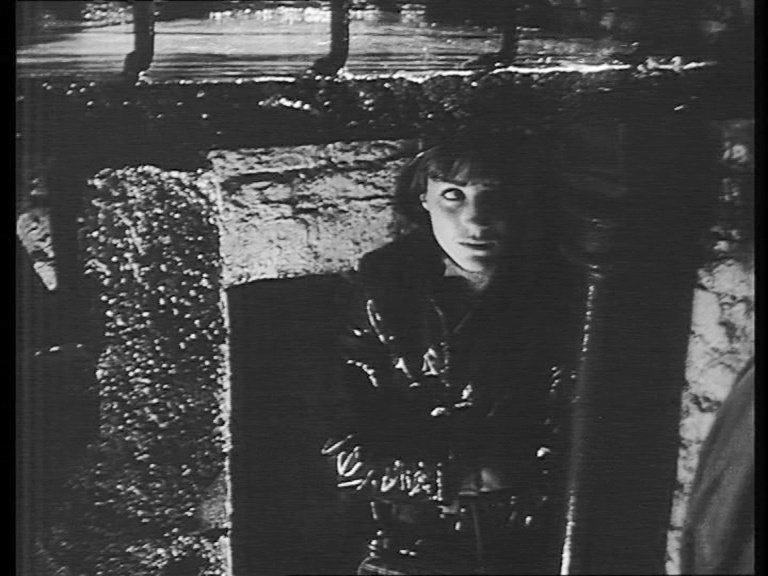 course of a dramatic rainy evening that springboards into a series of fantasies set in public and private. Both productions are surprisingly cinematic and visually striking, including some ambitious camerawork and potent images like a pair of identical twins watching a ping-pong game, a duel with broken champagne glasses, or an ornate serving tray covered in rattling, glittering clear marbles as dramatic punctuation. Also included as an extra is Writers in Conversation: Harold Pinter (1984, 46m34s), a TV interview about his thoughts on the current political state around the world and stories about his time in Turkey.
course of a dramatic rainy evening that springboards into a series of fantasies set in public and private. Both productions are surprisingly cinematic and visually striking, including some ambitious camerawork and potent images like a pair of identical twins watching a ping-pong game, a duel with broken champagne glasses, or an ornate serving tray covered in rattling, glittering clear marbles as dramatic punctuation. Also included as an extra is Writers in Conversation: Harold Pinter (1984, 46m34s), a TV interview about his thoughts on the current political state around the world and stories about his time in Turkey.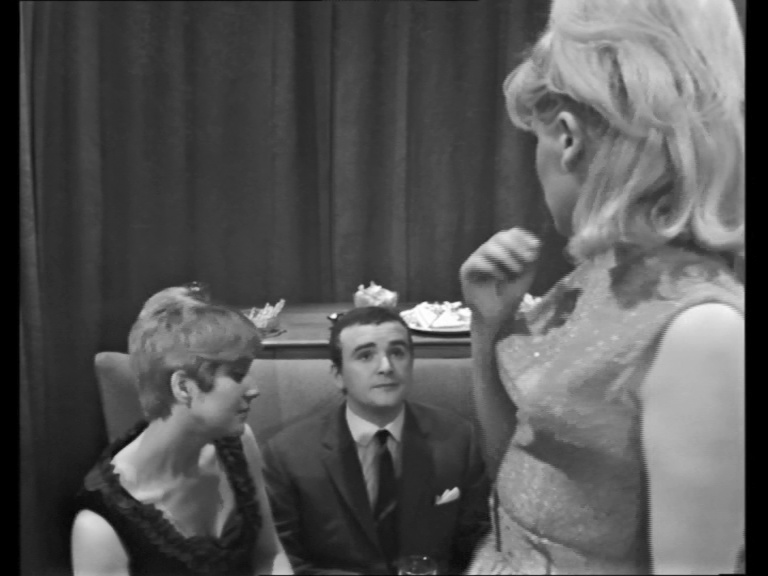 works with an open-ended conclusion that could be read as sexist or the exact opposite depending on what you think happens
works with an open-ended conclusion that could be read as sexist or the exact opposite depending on what you think happens 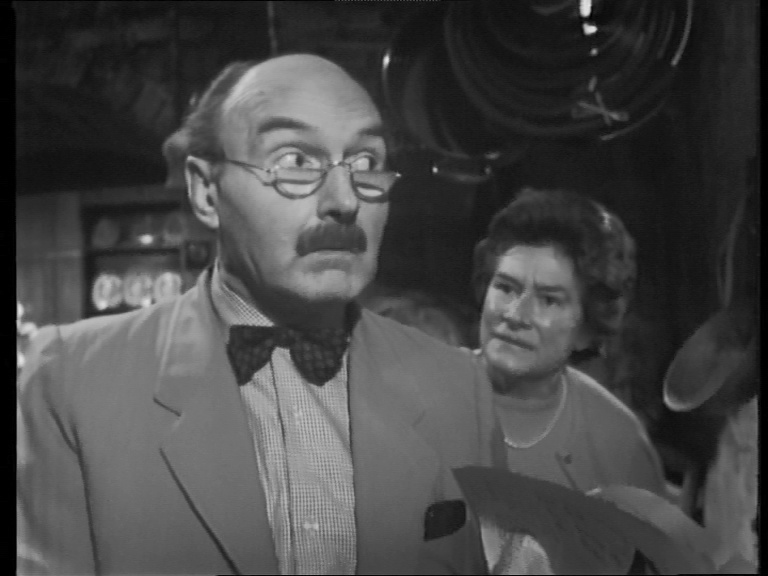 next (and what it all really means). Both productions also come from Theatre 625.
next (and what it all really means). Both productions also come from Theatre 625.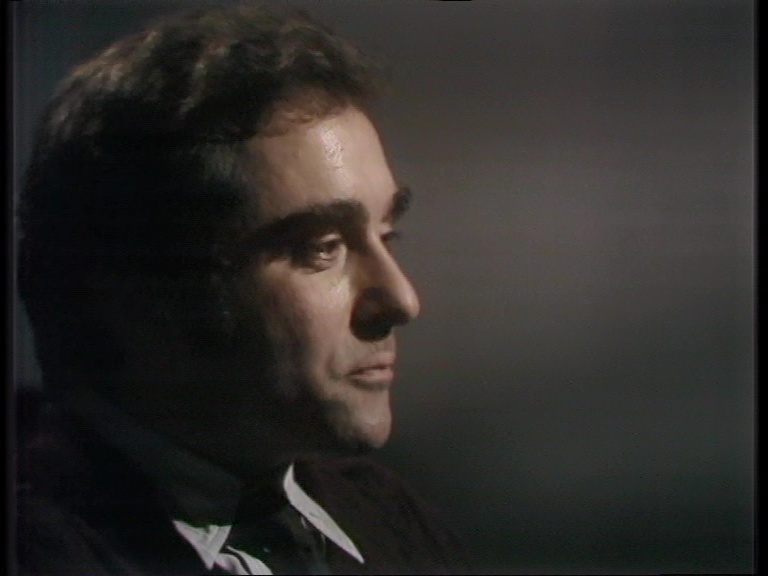 (4m14s), (3m6s), "Request Stop" (3m6s), "The Black & White" (4m40s), and "The Applicant" (4m41s) -- offering little observations written by Pinter about mundane activities like waiting for public transportation or applying for a job.
(4m14s), (3m6s), "Request Stop" (3m6s), "The Black & White" (4m40s), and "The Applicant" (4m41s) -- offering little observations written by Pinter about mundane activities like waiting for public transportation or applying for a job. 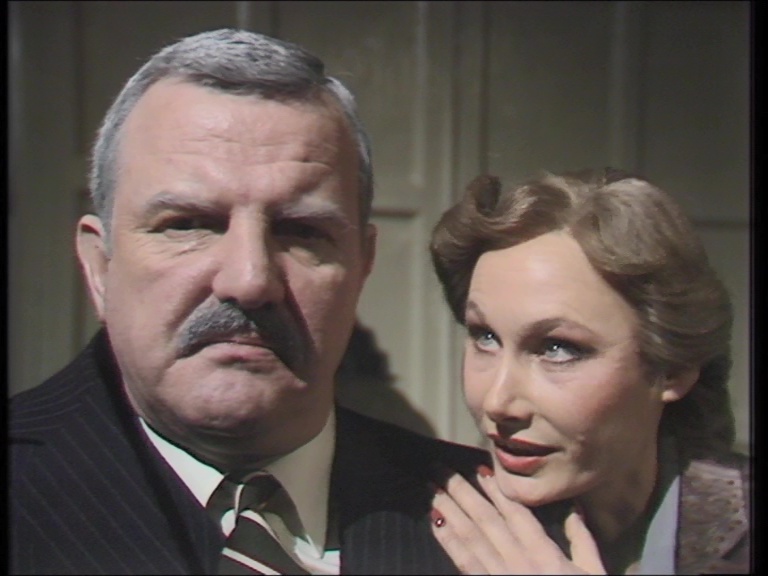 Kicking off disc four, it took 22 years for Pinter's The Hothouse (1982, 111m26s) to see the light of day in any form. A look at the toxic combination of totalitarianism and incompetence, it focuses on a mental treatment center where dissidents are kept out of sight and remain at the behest of the state who can keep them from ever breathing free air again. Pure speculative nightmare when it was written, the piece had eerie parallels to reality by the time it hit the air and actually feels mild now; that's not to its benefit as it hammers a fairly obvious point home repeatedly for nearly two hours as it veers into territory familiar from Terry Gilliam's Brazil. Of great historical value though, it is still worth a look for its four-person cast including Angela Pleasence (From Beyond the Grave) and Edward de Souza (Hammer's Phantom of the Opera) as well as its sheer eerie prediction of where the world was heading. Much more concise and immediately chilling is Mountain Language (1988, 20m32s), a creepy little snapshot of an oppressive government (led by an always effective Michael Gambon) that overreacts when a concerned wife (Miranda Richardson) and mother (Eileen Atkins) come looking for a man being held captive in a realm of seemingly endless snow and barbed wire. Even forbidden to speak their own language, they find themselves up against forces far more nightmarish than they can handle. Inspired by Pinter's recent journey to Turkey to gain ammunition against the persecution of so-called dangerous writers, it's a little tour de force for the talent involved with a particularly nasty punchline at the end.
Kicking off disc four, it took 22 years for Pinter's The Hothouse (1982, 111m26s) to see the light of day in any form. A look at the toxic combination of totalitarianism and incompetence, it focuses on a mental treatment center where dissidents are kept out of sight and remain at the behest of the state who can keep them from ever breathing free air again. Pure speculative nightmare when it was written, the piece had eerie parallels to reality by the time it hit the air and actually feels mild now; that's not to its benefit as it hammers a fairly obvious point home repeatedly for nearly two hours as it veers into territory familiar from Terry Gilliam's Brazil. Of great historical value though, it is still worth a look for its four-person cast including Angela Pleasence (From Beyond the Grave) and Edward de Souza (Hammer's Phantom of the Opera) as well as its sheer eerie prediction of where the world was heading. Much more concise and immediately chilling is Mountain Language (1988, 20m32s), a creepy little snapshot of an oppressive government (led by an always effective Michael Gambon) that overreacts when a concerned wife (Miranda Richardson) and mother (Eileen Atkins) come looking for a man being held captive in a realm of seemingly endless snow and barbed wire. Even forbidden to speak their own language, they find themselves up against forces far more nightmarish than they can handle. Inspired by Pinter's recent journey to Turkey to gain ammunition against the persecution of so-called dangerous writers, it's a little tour de force for the talent involved with a particularly nasty punchline at the end. 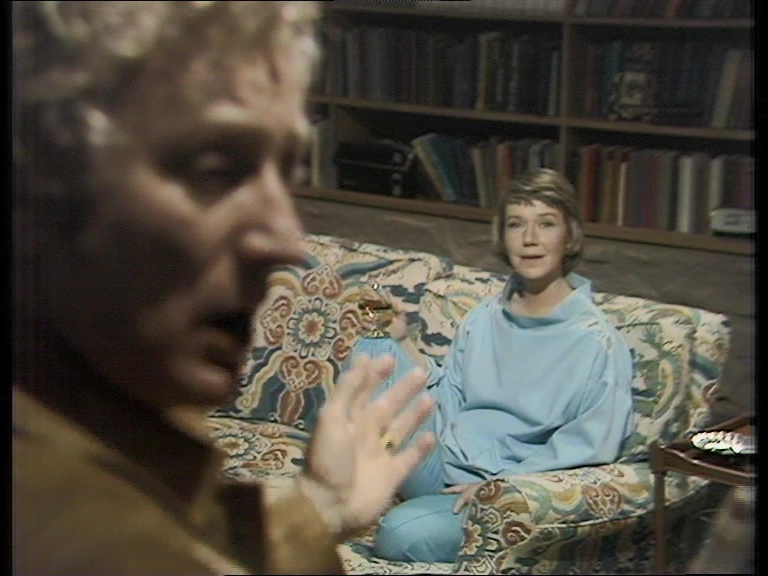 Finally on disc five, the sole production is The Birthday Party (107m28s) with Pinter stepping in front of the
Finally on disc five, the sole production is The Birthday Party (107m28s) with Pinter stepping in front of the 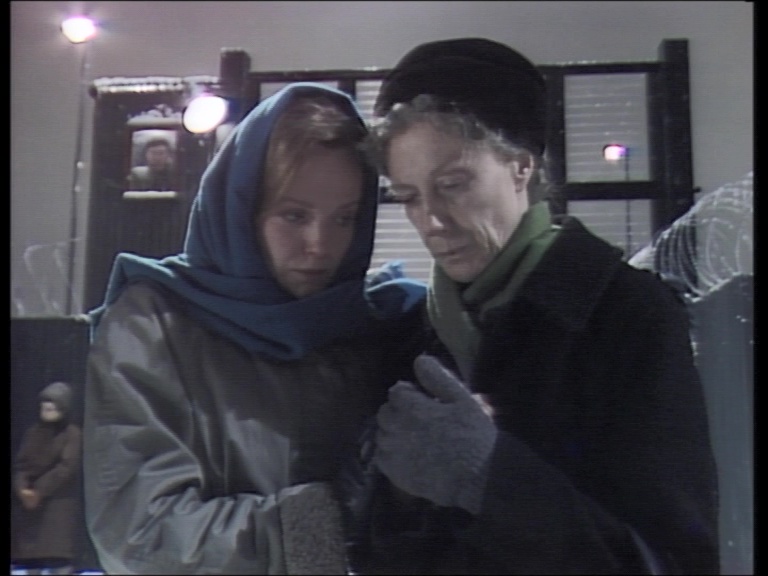 camera again for one of many versions of this oft-performed drama most famously made into a 1968 film by William Friedkin. Here Kenneth Cranham stars as Stanley, a pianist living at a seaside boarding house run by Meg (Joan Plowright). The arrival of strangers in the house (including Blakely again as well as a late, brief appearance by a young Julie Walters) soon turns his life upside down with an unseen boss giving an order that's never quite understood. Also on the disc is a lengthy interview, Face to Face: Harold Pinter (1997, 39m7s) with Sir Jeremy Isaacs, and a Guardian Interview that runs for 71 minutes as an audio track with the main feature.
camera again for one of many versions of this oft-performed drama most famously made into a 1968 film by William Friedkin. Here Kenneth Cranham stars as Stanley, a pianist living at a seaside boarding house run by Meg (Joan Plowright). The arrival of strangers in the house (including Blakely again as well as a late, brief appearance by a young Julie Walters) soon turns his life upside down with an unseen boss giving an order that's never quite understood. Also on the disc is a lengthy interview, Face to Face: Harold Pinter (1997, 39m7s) with Sir Jeremy Isaacs, and a Guardian Interview that runs for 71 minutes as an audio track with the main feature. Reviewed on February 13, 2019.
![]()